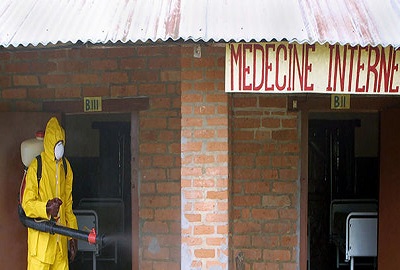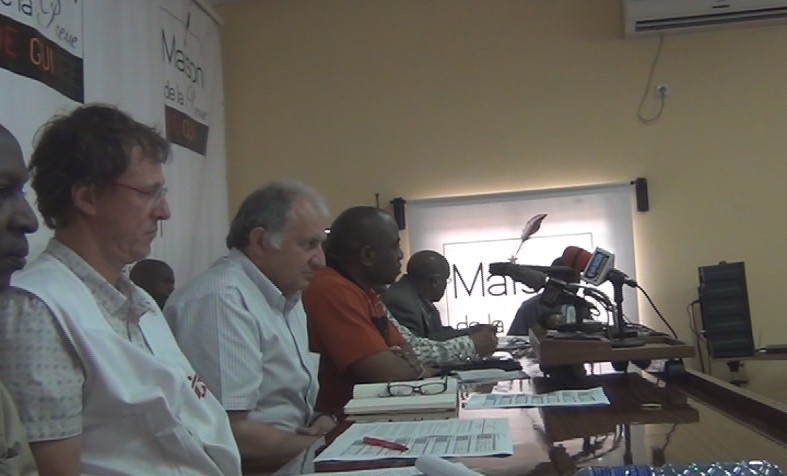They call him by his surname, Konneh. His manners are gentle and his voice calm. He’s a volunteer with the Sierra Leone Red Cross Society, always willing to help.
The 21-year-old lives in Kenema, one of the largest cities in Sierra Leone. It’s a two-hour drive from his hometown of Daru, in the eastern district of Kailahun, which has been most affected by the Ebola outbreak in Sierra Leone.
As of 16 June, there were 92 confirmed cases of Ebola and 44 deaths in Kailahun, according to the World Health Organisation, while several cases have also been confirmed in the west of the country.
Konneh’s aunt and uncle, from Daru, both died from the disease.
First, they took his uncle to the treatment centre for Ebola in Kenema. Two days later, they brought his aunt.
“His wife was a nurse. My uncle got it from his wife,” Konneh says calmly. His cousin also died from the virus.
“When health workers start dying from Ebola, the entire health care system is affected,” says Amanda McClelland, an emergency health officer at the International Federation of Red Cross and Red Crescent Societies (IFRC).
“Doctors and nurses are afraid to go to work or to treat patients, which is what we are seeing in Sierra Leone at the moment.”
But with proper training and by taking adequate precautions, health care workers can safely treat Ebola patients. And the sooner treatment can start, the greater the chances of survival.
Most of the people affected by Ebola in Sierra Leone are women as they are the ones who take care of sick family members and relatives.
Women also care for the body of a person who has died, which can be highly infectious if not properly handled.
Fear and fable
There is a lot of fear, denial and stigma attached to the highly contagious disease, as it’s the first time it’s appeared in Sierra Leone.
“I’m scared. Ebola, it’s dangerous. People are saying Ebola does not exist but I’ve seen it,” Konneh says.
Some communities are denying entry to government and aid workers, while many of those who may have come into contact with the virus and need to be watched disappear and cannot be monitored.
Some believe that Ebola is caused by witchcraft. One of the most widespread stories related to the Ebola outbreak is this: a woman in a village went on a journey and left a box at home, instructing her husband not to open it.
The husband opens the box and finds a snake inside, which tells the husband not to reveal his presence or else the snake will kill everyone in the village.
The husband does not heed the warning and spreads the word about the snake’s presence. The snake goes on a killing spree.

The
Red Cross is using radio to reach people in Sierra Leone with messages
on how to protect themselves from Ebola – ©IFRC/Cristina Estrada
“If people believe Ebola is real, we can control it,” Konneh explains.
But a lack of understanding means people will often only believe what they see.
And for those who accept that Ebola is a real disease, many believe it’s always fatal and therefore don’t seek medical help when they have the symptoms.
Fighting Ebola
However, to date, ten people have survived Ebola and have been discharged from the hospital in Kenema and are back home with their families.
“An increase in awareness raising and outreach to communities will be effective in dispelling erroneous stories and beliefs,” explains Amanda.
“Fighting stigma, changing behaviour and seeking hospital care as soon as possible are the key elements to fighting Ebola.”
As for Konneh, he knows what it’s like to receive help from the Red Cross. His path into the Sierra Leone Red Cross Society, which he joined four years ago, was born out of tragedy. His father was taken and killed during a time of conflict, along with his grandfather.
“The Red Cross came to my village and took care of us. When they asked who wanted to be a volunteer, I said yes,” he recalls. Today, it’s his turn to help take care of others.
This blog is an edited piece by Cristina Estrada, IFRC
- The IFRC is supporting the Sierra Leone Red Cross Society’s response to the Ebola outbreak, educating people about how to protect themselves from the virus and help prevent it spreading.
- Similar emergency operations have been launched in Guinea and Liberia. Preparedness operations are underway in the Ivory Coast, Mali and Senegal in case the virus spreads even further.
- The British Red Cross has sent a number of health workers to the region since the outbreak began – find out more.
- Read more: Awareness campaigns the key to halting outbreak.
- Read more: Ebola, a threatening disease for health workers.
- http://blogs.redcross.org.uk/emergencies/2014/06/ebola-snakes-and-witchcraft-stopping-the-deadly-disease-in-its-tracks/















